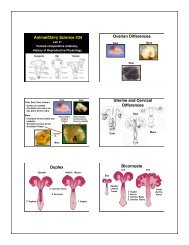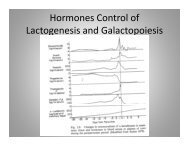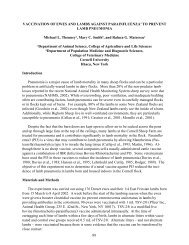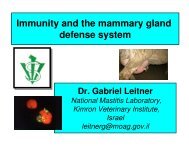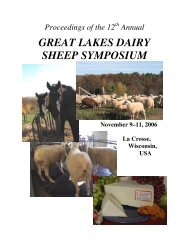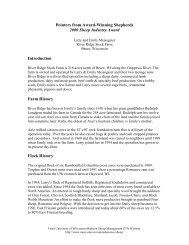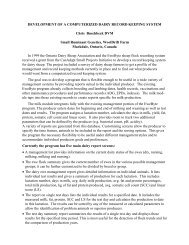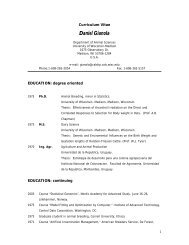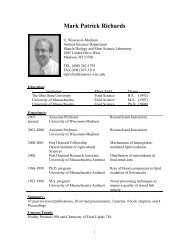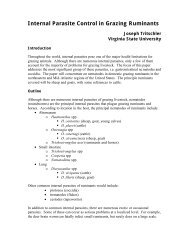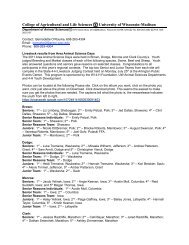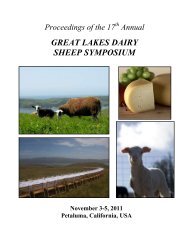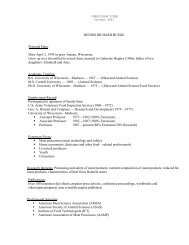Dairy Sheep Symposium - the Department of Animal Sciences ...
Dairy Sheep Symposium - the Department of Animal Sciences ...
Dairy Sheep Symposium - the Department of Animal Sciences ...
You also want an ePaper? Increase the reach of your titles
YUMPU automatically turns print PDFs into web optimized ePapers that Google loves.
REGULATIONS FOR SHEEP MILK<br />
Bruce Carroll<br />
Food Safety Supervisor<br />
Wisconsin Division <strong>of</strong> Agriculture, Trade and Consumer Protection, Division <strong>of</strong> Food Safety<br />
Eau Claire, Wisconsin<br />
History<br />
The WDATCP Food Division, became aware <strong>of</strong> and began regulating dairy sheep operations<br />
in 1989. Hal Kohler <strong>of</strong> Polk County was <strong>the</strong> first licensed sheep milker in Wisconsin. At that<br />
time sheep milk was not defined as “milk” by State Statute 97 and <strong>the</strong>refore was not governed by<br />
dairy regulations.<br />
The Food Division made <strong>the</strong> decision to license <strong>the</strong>se early sheep milk farms as food processors.<br />
However, it was presumed that eventually <strong>the</strong>se farms would come under <strong>the</strong> dairy regulation.<br />
Guidelines were <strong>the</strong>refore developed to permit sheep milkers to eventually be licensed as<br />
dairy farms.<br />
In 1994 State Statute 97 was amended to include sheep milk in <strong>the</strong> definition <strong>of</strong> milk. At that<br />
point ATCP 60 became <strong>the</strong> regulation governing sheep dairies. Since that time, <strong>the</strong> Food Division<br />
has been working with dairy sheep producers to license farms according to Wisconsin<br />
Administrative Code ATCP 60, <strong>the</strong> dairy farm regulation.<br />
Licensing<br />
Wisconsin Administrative Code ATCP 60 requires that all dairy farms in Wisconsin be<br />
licensed. The customary way <strong>of</strong> becoming a licensed farm in Wisconsin is to first choose a<br />
plant to receive <strong>the</strong> milk. The plant <strong>the</strong>n has <strong>the</strong> responsibility to insure that minimum requirements<br />
for a grade B dairy farm are met. Once <strong>the</strong> requirements are met, <strong>the</strong> inspector is informed<br />
and a licensing inspection takes place.<br />
• Acceptable farm conditions shall include minimum physical facility standards as follows:<br />
• A suitable milking barn with a concrete floor, walls and ceiling in good repair and cleanable,<br />
adequate lighting.<br />
• A suitable milk house with a concrete floor, walls and ceiling in good repair and cleanable,<br />
doors and windows properly installed, adequate lighting, and a hose port if a bulk tank is<br />
used for <strong>the</strong> collection <strong>of</strong> milk.<br />
• A safe water supply. Note: Water supplies <strong>of</strong> grade B farms are not subject to enforcement<br />
action <strong>of</strong> Chapter NR 112, Wisconsin Administrative Code by WDATCP staff.<br />
• Hot and cold water under pressure.<br />
• A two compartment wash sink and a hand wash sink.<br />
• Utensils, containers, and equipment shall be <strong>of</strong> proper design and material.<br />
• A toilet convenient to <strong>the</strong> milking operation.<br />
• A suitable way <strong>of</strong> cooling milk under 45° within two (2) hours <strong>of</strong> milking and freezing milk<br />
and keeping it frozen at 0°F or less.<br />
After assuring that <strong>the</strong> above minimum requirements are met and receiving a properly filled<br />
out dairy producer application and inspection form from <strong>the</strong> plant, <strong>the</strong> inspector will ei<strong>the</strong>r grant<br />
or deny <strong>the</strong> dairy producer license. Once <strong>the</strong> license is granted, it is <strong>the</strong> plant’s responsibility to<br />
perform quality tests including antibiotic screening before accepting any milk.



